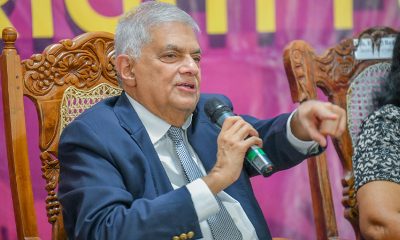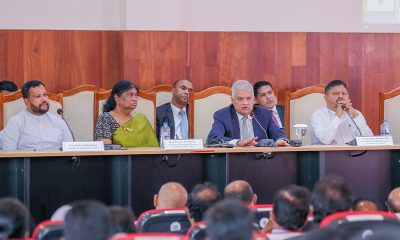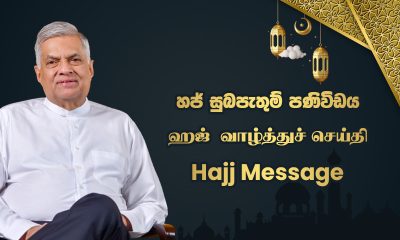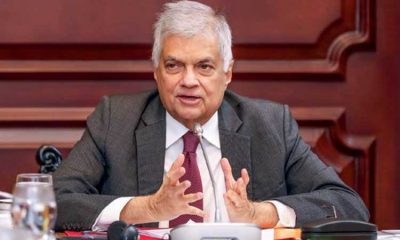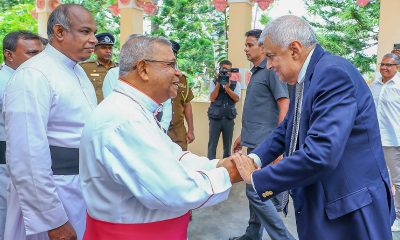Editorial
Bragging, begging and booing

Friday 5th January, 2024
The UNP is in overdrive to shore up what remains of its image with an eye to the next election. It is bragging that the country has posted a primary surplus after a lapse of more than two decades. It insists that credit for this be given to President Ranil Wickremesinghe, who is also the Minister of Finance.
A positive primary balance is no mean achievement for an insolvent nation. As for the countries troubled by staggering outstanding public debt, achieving a primary surplus could be considered very important, but the fact remains that necessary as it may be, it is not sufficient for achieving debt reduction, which requires a multi-pronged strategy and the proper implementation thereof.
The government has a long way to go before it can put the economy on an even keel. It is hoped that the UNP supporters who lit firecrackers at Sirikotha and made a spectacle of themselves when the IMF announced the release of the first tranche of its loan, in March 2023, will not do likewise to celebrate the marginal primary surplus.
In increasing state revenue, the SLPP-UNP administration seems to think that the end justifies the means. Blind to the social costs of its extreme actions, it has resorted to jacking up taxes and tariffs exponentially without exploring alternative means of boosting state revenue. Ironically, TIN (Tax Identification Number) has been made mandatory for even young citizens aged 18, whose parents have been reduced to penury and left with no alternative but to beg for alms, with empty ‘tins’ in hand. Sri Lanka must be the only country where a bunch of failed, corrupt rulers who deserve to be thrown behind bars for bankrupting the economy are allowed to stay in power, live the high life at the expense of the public and, worse, punish the victims of their economic crimes by increasing taxes and tariffs in the name of economic recovery.
If the Rajapaksa-Wickremesinghe government streamlines revenue collection and expands the personal tax base, it will be able to lessen its dependence on indirect taxes, which affect the entire population. Tax increases alone will not help the government achieve its revenue targets. For instance, the enhanced VAT regime has sent liquor prices up, but there is no guarantee that the government will be able to rake in the projected revenue from the tax increase, for it has failed to eliminate the revenue sticker racket; liquor manufacturers can continue to release part of their output into the market surreptitiously and avoid taxes thereon. Successive governments have not taken action to rid the revenue generating state agencies, such as the Customs and the Department of Motor Traffic, of corruption, which is believed to cost the state coffers billions of rupees a year.
The government has also not cared to curtail its expenditure while asking the public to tighten their belts. This is an election year, and the ruling party politicians have embarked on an election campaign in all but name by spending public funds. They are stumping the country on the pretext of attending official events. It is time laws were brought in to prevent politicians from spending taxpayers’ money on election campaigns.
Chief Government Whip and Minister Prasanna Ranatunga has unwittingly disclosed, in a bid to turn public opinion against the Opposition for disrupting last month’s VAT debate in Parliament, that a single parliamentary sitting costs the public as much as Rs. 10 million. More often than not, parliamentary sessions are inquorate, and debates serve little purpose. Serious thought should therefore be given to downsizing Parliament and curtailing the cost of maintaining it.
Let the government be urged to be mindful of the social, political and economic consequences of overtaxation. Extremely high taxes hamper economic growth in the long run. It greatly reduces the people’s spending power and thereby limits consumer activity, and investment. It also discourages entrepreneurship and innovation and reduces job creation and competitiveness. Overall, it adversely impacts quality of life, as evident from the increasing number of public protests against overtaxation, which leads to tax evasion or avoidance, taking its toll on state revenue.
The government had better stop bleeding the public dry at least for its own sake. People’s anger has reached a tipping point. A cantankerous ruling party politician who attended a meeting in Anuradhapura the other day had to head for the hills to the accompaniment of a cacophony of boos from the people present there. This could be considered the portent of the onset of another tsunami of public consternation.
Editorial
Arrogance of power

Friday 16th May, 2025
President Anura Kumara Dissanayake has begun to sound just like his predecessors, who succumbed to the arrogance of power and alienated the public. He has declared that he is ready to do everything in his power to enable the JVP-led NPP to secure the control of all local councils it has won with or without absolute majorities. Speaking at a ceremony to mark the 60th anniversary of the JVP, on Wednesday, Dissanayake said he would not hesitate to make use of the government’s two-thirds majority to achieve that goal.
The problem with power is that it goes to the heads of the wielders thereof and makes them take leave of their senses. Executive presidential powers can act like a mind-sucker, draining empathy, humility and rational thought from even the most grounded politicians. This has been our experience over the past several decades. Hence the aversion of the champions of democracy to the executive powers of the President. Even some defenders of democracy who secured the presidency with good intentions let their executive powers get the better of them.
In 1994, Chandrika Kumaratunga became the President, vowing to eliminate corruption (dooshanaya) and state terror (bheeshanaya), but her rule became a metaphor for political violence, election malpractices and corruption. The less said about J. R. Jayewardene, Ranasinghe Premadasa and Mahinda Rajapaksa, the better. President Maithripala Sirisena also abused his executive powers unflinchingly; in 2018, he sacked the UNF government, appointed Mahinda Rajapaksa Prime Minister, and then ordered the dissolution of Parliament in violation of the Constitution. Thankfully, a historic Supreme Court judgement restored the status quo ante.
Even non-elected President Ranil Wickremesinghe was intoxicated with executive powers from 2022 to 2024; he caused the local government elections to disappear and suppressed democracy. D. B. Wijetunga served as the President only for a brief period from 1993 to 1994 following President Premadasa’s assassination, and President Gotabaya Rajapaksa could not complete his term.
It is against this backdrop that President Dissanayake’s aforementioned declarations and warnings that border on veiled threats should be viewed. General Secretary of the ITAK, and former TNA MP M. A. Sumanthiran has torn into President Dissanayake for his declaration that he will use his presidential power to secure control of local councils which, he thinks, the NPP deserves to run, in all parts of the country. The ITAK apparently feels threatened as the NPP has won a considerable number of seats in the LG bodies in the North and the East. If only the ITAK/TNA had defended democracy so ardently while the LTTE, which did not have representation even in a local council, was controlling the North and the East.
It is a supreme irony that President Dissanayake has said that he will not allow anyone to trifle with the NPP’s popular mandate. He has either forgotten or chosen to ignore that popular mandates come to naught when governments fail and public resentment spills over onto the streets, with thousands of people baying for the rulers’ blood. Gotabaya, who won the executive presidency outright in 2019 and helped the SLPP secure a two-thirds majority in Parliament in 2020, had to run away and resign during Aragalaya in 2022 as he and his government mismanaged the economy. The JVP, which had only three MPs, at that time, almost succeeded in marching on Parliament. Now that a bad precedent has been created, the Presidents who fail in the future may have to hightail it like Gotabaya. It is popularly said in this country that no clay pot is too big for a wooden pole.
It is only wishful thinking that the NPP will be able to arrest the decline in its national vote share and shore up its support base by gaining the control of the local councils, where it has not obtained absolute majorities. Not even its hold on the executive presidency and Parliament has helped the NPP prevent a severe erosion of its vote base during the past six months or so. It finds itself in this predicament because it has failed to live up to people’s expectations. Instead of bellowing rhetoric and issuing warnings and threats, the NPP leaders must solve the burning problems faced by the public. They must at least try to make salt freely available at reasonable prices.
Editorial
Right initiative: Follow-up needed

Thursday 15th May, 2025
There appears to be no let-up in road accidents in the central hills. A van plunged down a precipice in Ramboda, injuring 11 passengers, yesterday.
The police swing into action after catastrophic road accidents—not to address the root causes of those mishaps but to adopt band-aid solutions to deflect criticism. Following Sunday’s fatal bus accident, which killed 23 passengers near Kotmale, they have launched a programme to inspect long-distance buses at night. This measure is welcome, but it will have to be coupled with roadside drug tests to enhance their effectiveness. Drug addiction is believed to be prevalent among heavy vehicle drivers. One can only hope that the new scheme will not end up being like the practice of placing night patrol visit books at houses and shops after break-ins and forgetting them after a few weeks. The night-time bus inspection scheme however has the potential to keep bus workers and their employers on their toes.
Much is spoken about substandard medicinal drugs used in the state-run health institutions. An ex-Health Minister and some former Health Ministry panjandrums are facing legal action for the fraudulent procurement of medicines, etc. The need for such drastic measures to rid the Health Ministry procurement process of corruption, bring the corrupt to justice and ensure the safety of patients cannot be overstated. Worryingly, there has been no such public debate on the substandard buses in operation, endangering the lives of passengers and other road users alike.
Convener of the Road Safety Task Force Dr. Sanjay Perera has, in a recent television interview, told some home truths about the public transport sector and its deficiencies. Besides factors such as overloading and drivers’ fatigue, the poor quality of buses on Sri Lankan roads also contributes to ever increasing road accidents, he has said.
Dr. Perera has pointed out that most buses are not worthy of the name, for they are actually truck chassis fitted with seats; these ‘truck-buses’, as it were, are without any safety features, and, worse, have metal bars for headrests, which could pose a serious risk of neck injuries and spinal cord damage in the event of accidents. No wonder most commuters complain of back pain, neck and shoulder strain, postural problems, etc. These are believed to be the results of frequent travel in boneshakers with poor suspension and cramped seating. Dr. Perera has stressed the need for importing modern buses like the ones in operation on expressways.
Although the state-owned bus service has been drawing a lot of flak of late due to the Kotmale tragedy, the private bus operators are the worst culprits. Dr. Perera has called upon the SLTB and the transport authorities to enforce the laws and regulations already in place to ensure road safety. But the incumbent government apparently lacks a clear vision to develop the SLTB. It is also without the courage to tame the private bus owners, who have risen above the law just like the wealthy rice millers. The bus Mafia has effectively put paid to the government’s efforts to remove unauthorised accessories from private buses.
Successive governments have done very little to standardise the bus service. Their focus has been on fare systems and scheduling, and nothing has been done by way of improving driver training and behaviour and maintenance protocols. Private bus operators therefore are under the impression that they can run their buses the way they want.
The government should seriously consider making it mandatory for all bus workers to wear uniforms besides abiding by laws and regulations governing the transport sector. Enforcing discipline among bus workers will be half the battle in ensuring road safety.
Editorial
Rides into the jaws of death

Wednesday 14th May, 2025
It never rains but it pours. Less than 48 hours after Sunday’s tragic accident, where an SLTB bus careened off a winding road and plunged down a precipice near Kotmale, killing 22 passengers and injuring 35 others, a private bus veered off the road, injuring 30 passengers, in Kandy, on Monday night. Thankfully, there were no fatalities. The mishap has been attributed to a brake failure. The Grim Reaper has been in overdrive on Sri Lankan roads.
The police are reported to have appointed a committee headed by SDIG Ajith Rohana to probe Sunday’s fatal accident. It is hoped that the committee members, who are senior police officers, will conduct a thorough investigation, and action will be taken, based on their findings and recommendations, to prevent road accidents.
No sooner had Sunday’s accident had occurred than some SLTB officials claimed that the ill-fated bus had experienced a sudden brake failure while negotiating a bend. But an inspection of the vehicle, or what remains of it, has reportedly revealed that it experienced no mechanical defect. Some media reports have said the driver of the bus had been working for more than 12 hours continuously and was fatigued. The SLTB is overstaffed, and it defies comprehension why its workers have to exert themselves to the point of burnout.
Safety regulations require that heavy vehicle drivers work for only about six hours a day lest they should be fatigued and drowsy. Road safety experts inform us that most road accidents occur due to human error—drivers become either reckless, distracted or fatigued; due to the circadian rhythm, most drivers become drowsy between midnight and 7:00 a.m. and between 2:00 a.m. and 4:00 p.m. This is believed to be the main reason for most crashes on expressways as well as other roads. It has to be addressed as a national priority to prevent crashes and make roads safe.
As for drowsiness or sleep-related road accidents, which have become a significant concern, there is a need for more rest areas along the expressways. Besides, technology provides solutions. There are electronic devices that detect signs of fatigue or distraction of drivers and alert them to prevent accidents. Modern vehicles come fitted with them, and some drowsiness detection systems can be retrofitted to older vehicles to help save lives. Making such technologies available at affordable prices should be part of any road safety programme. Most of all, measures should be adopted to ensure that heavy vehicle drivers are well-rested and sober before getting behind the wheel, and all vehicles must be inspected to ensure their roadworthiness.
Meanwhile, the police should reveal what action they have taken against the NPP activists who parked buses on the Southern Expressway illegally on May Day. A few days prior to that incident, the police had fined the driver of a bus carrying a group of schoolchildren for the same offence, we are told. If the culprits are allowed to get off scot-free because they are NPP supporters, a very bad precedent will be set, and the government’s approval rating will plummet further. Sadly, the culture of impunity, which the present-day leaders promised to do away with, persists.
President Anura Kumara Dissanayake, taking part in a television interview a few days before the recent local government polls said those who were responsible for the expressway incident would have to face legal action. He also said they may have been compelled to stop on the expressway as the rest areas had been full of vehicles. If so, they should have taken the next exit, had lunch and re-entered the expressway. Nothing can be cited in extenuation of the serious offence they committed.
The success of any programme to ensure road safety hinges on the strict enforcement of traffic laws. Impunity undermines public trust and compromises road safety efforts.
-

 Features5 days ago
Features5 days agoSAITM Graduates Overcome Adversity, Excel Despite Challenges
-

 News5 days ago
News5 days agoDestined to be pope:Brother says Leo XIV always wanted to be a priest
-

 Opinion5 days ago
Opinion5 days agoDrs. Navaratnam’s consultation fee three rupees NOT Rs. 300
-

 Foreign News6 days ago
Foreign News6 days agoMexico sues Google over ‘Gulf of America’ name change
-

 Sports5 days ago
Sports5 days agoASBC Asian U22 and Youth Boxing Championships from Monday
-

 Features4 days ago
Features4 days agoChampioning Geckos, Conservation, and Cross-Disciplinary Research in Sri Lanka
-

 Business5 days ago
Business5 days agoDilmah – HSBC future writers festival attracts 150+ entries
-

 Business5 days ago
Business5 days agoBloom Hills Holdings wins Gold for Edexcel and Cambridge Education



